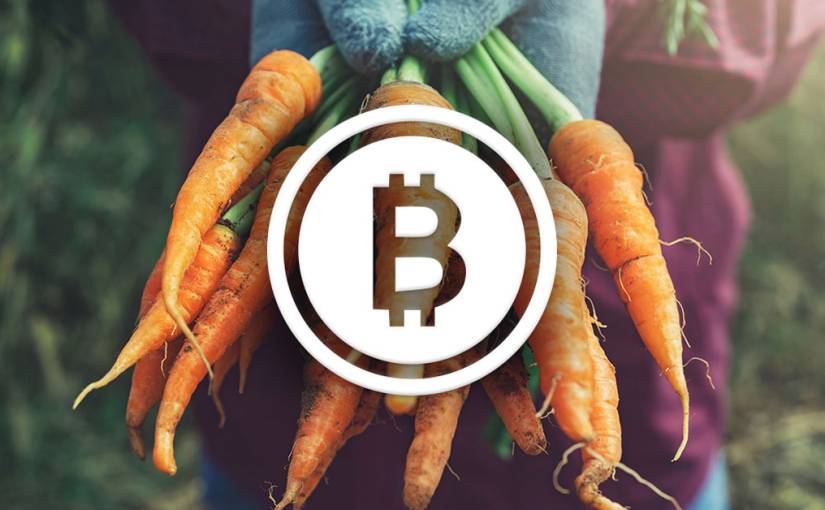An efficient logistics and supply chain system in the agriculture sector are as important as an efficient crop production system. Blockchain technology can ensure this needed efficiency.
Fulfilling the food demand of a constantly rising population is a complicated process. It involves a complex supply chain between resource providers (transporters), crop producers (farmers), retailers, and end-users. The functioning of such a complex system usually involves a lot of paperwork and management challenges.
Traditionally, such logistic tasks were managed with paper-based documentation. However, with the onset of technology, the documentation moved to computers, making the task less complicated; and quicker.
Blockchain Technology is Optimizing Supply Chain System in Food
The next step in Blockchain technology is for making the supply chain management in the food and agriculture industry more efficient and manageable.
Using Blockchain technology offers tamper-proof, precise statistics about the farms, inventory, credit scores, and food tracking.
According to industry experts, the blockchain in the agriculture and food market is still developing. Increased research and development activities help to develop blockchain technology. Retailers, food processors, and food distributors are also increasing blockchain adoption.
Market analysis by BIS Research, the global blockchain in the agriculture and food market was valued at $139.6 million in 2020. Global Blockchain is growing with a CAGR of 51.0% and reach $1.48 billion by 2026.
Factors such as the increased need for transparency in the food supply chain and supportive government initiatives will drive the market’s growth in the future.
Supply Chain Management in Agriculture and Food Industry
The process of delivering the agricultural products from the producers to the consumers is known as the agriculture supply chain. This process involves numerous stakeholders such as resource providers, farmers, distributors, and wholesalers. Therefore, efficient interaction between all the stakeholders is essential for the smooth functioning of the food and agriculture industry.
Multiple people interact for diverse competing purposes, with numerous material and informational flows. This fundamentally makes the supply-chain activities complicated.
Fragmented and incomplete incoming flow of information can complicate the process and increase challenges in the agriculture supply chain system.
According to Authentium — The three phases of a typical agriculture supply chain are as follows:
- farmers to intermediate silos,
- silos to transformation facilities,
- and transformation plants to clients.

It is crucial to establish a smooth relationship between all the stakeholders involved in supply chain management. Sometimes, the conflict of interest or miscommunication between two parties can lead to huge losses for all the people involved in exchanging products.
Hence, to maintain a smooth flow of materials, money, and information, a transparent and decentralized medium such as blockchain offers the best solution to the problems arising in the current supply chain management system.
How is Blockchain Helping Supply Chain Management in Agriculture & Food Industry?
The application of blockchain technology in the agriculture supply chain revolutionizes how information is exchanged between two parties. Blockchain technologies distributed databases share among the nodes of a computer network storing information electronically in digital format. Blockchains enable safe, transparent data storage.
In the food and agriculture industry, blockchain has several applications. When combined with the internet of things (IoT) and data analytics, blockchain can provide a shared standard for every stakeholder in the supply chain to log and exchange data at each stage of the commodity’s journey.
Such a method will enable all the stakeholders to access crucial and correct data, gain better efficiency and higher revenues, and maintain sustainability and transparency with the consumers and government.
These days, the aware consumers are interested in the information about the origin and the quality of the food they consume. Hence, the need for curating a safe supply chain system with high food quality has increased.

On the other hand, consumers demand digital services tailored to their specific requirements. Blockchain technology in agriculture and farm management software helps improve the financial performance of farms and fulfills the need for food for a rising population.
Advanced agricultural technologies, such as precision farming, farmland mapping, IoT sensors, and vertical farming systems, achieve higher-yield food production.
Additionally, location intelligence, crop management software, and transportation technologies are prominent examples of how technology enables agricultural businesses to achieve better food production and supply chain management results.
Increased food consumption creates additional challenges, such as substitute foods in the market.
Therefore, it threatens agricultural food supply chains at various levels. Currently, farmers and consumers are at a disadvantage due to a lack of transparency and inefficiency in the system. However, blockchain for the agriculture supply chain can empower all market stakeholders by establishing trusting partnerships.
Best Supply Chain Management Practices in Agriculture and Food Industry
Integration of advanced technology such as blockchain raises the productivity and efficiency level of the supply chain management system. However, transitioning from the traditional method to the new approach is certainly challenging.
However, few fundamental practices may ensure regularity and smooth functioning regardless of the system’s exchange method. Following are some of such best practices:
-
Ensuring the quality and safety of food is helped by using blockchain technology.
Ensuring the quality and safety of food is essential for maintaining the trust of the end consumers. Food contamination and fraud are among the biggest concerns in the industry today, affecting businesses.
As consumers become more aware and cautious of what they are consuming, any stakeholder in the supply chain system will know exactly who is carrying the food items. Storage location and transportation information are readily available.
-
Establish policies to ensure regular audits
Establish policies to ensure regular audits at the facilities and the carrier’s/supplier’s warehouses. These records eliminate inefficiencies and problems preventing a streamlined supply chain process.
In addition, audits can be a valuable practice to ensure compliance and improve the brand’s reputation.
-
A comprehensive tracking system
A comprehensive tracking system is essential to track food along each step of the supply chain process. Government legislation requires importers to show a catalog of information to the FDA before importing any items.
This includes code numbers, identifiers, and other data. Proper labeling and oversight will ensure FDA compliance and help producers prevent disease or foodborne illnesses from spreading.
-
The use of automatic identification systems
The use of automatic identification systems is essential for stakeholders to oversee the complete process from farming to grocers making a sale to consumers. For instance, RFID transponders can trace livestock, deliveries, purchases, and other aspects of the supply chain.
In addition, these tracking solutions provide information to participants in the supply chain to identify spoiled food sources or deliver real-time data on food safety audits.
Blockchain Technology Can Prevent Food Spoilage and Waste in the System
Technologies allow workers to perform temperature checks and environmental measurements on food data gathered from its original point (the farm). Throughout the supply chain journey workers ensure the safety conditions are met.
Careful monitoring of food safety conditions ensures the prevention of any food spoilage/waste incidents and increases the company’s reputation with consumers.
Conclusion
The use of blockchain technology has given a safe and transparent platform for the food and agriculture industry. Today, transparency is an essential aspect of consumer satisfaction.
Furthermore, with the increasing use of blockchain in the agricultural supply chain, stakeholders have begun to acknowledge the high potential of the technology.
The arrival of blockchain is timely because of the rising demand for supply chain transparency and traceability. Additionally, the blockchain necessity is motivated by the increasing number of food outbreaks and food-borne illnesses.
Image Credit: Provided by the Author; Thank you!










